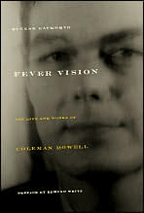
 In
2005 when I decided I had to move on with other work, I had to close
The Independent Gay Writer online magazine, but one of our
most constant and entertaining reviewers has submitted a new review for
a new book, written by another of our reviewers.
In
2005 when I decided I had to move on with other work, I had to close
The Independent Gay Writer online magazine, but one of our
most constant and entertaining reviewers has submitted a new review for
a new book, written by another of our reviewers.So we bring back Tony Heyes, our inimitable Englishman, reviewing Gene Hayworth's new book, Fever Vision: The Life and Works of Coleman Dowell
 A
Fragmenting Life
A
Fragmenting Lifea review
by Tony Heyes
Fever Vision
by Eugene Hayworth
Preface by Edmund White
Published by Dalkey Archive Press 2007
ISBN-13: 978-1-56478-457-5
ISBN-10: 1-56478-457-6
Eugene Hayworth's fascinating study of the life of the novelist Coleman Dowell is almost a morality tale. How was it that a young man, so good looking and so talented and in a long-term, supportive relationship, could come to consider his life such a failure that he ended it? Mr. Hayworth lays bare all the clues in his skilful reconstruction of the events of Dowell's life.
Robert Coleman Dowell was born in Kentucky in 1925. He was a member of an extensive working-class family. From an early age he showed the usual attributes of a gay child – an indifference to games, an interest in music, words and drama together with a precocious need to express himself. Although he faced some hostility from his siblings on account of his "otherness", he secured a reasonable education. The family was poor but not so poor that he felt in any way deprived.
After a stint in the armed forces (there was a war on!) Dowell started a career in television as a prolific songwriter. Although perhaps not as jagged with sophistication as were theirs, his songs have been compared to those of Cole Porter and Noël Coward in their facility and ingenious rhyming schemes. Unfortunately, lacking Porter's wealth and Coward's steely resolve, Dowell did not meet with the same success as they. He wasted many years in the swamp that is Broadway trying to get a musical that he had written, "The Tattooed Countess", produced. It flopped after four nights. Success would have brought him fame and money. The discrepancy between the reviews – it was universally panned – and Dowell's faith and enthusiasm in the musical is difficult to understand without the possibility of seeing it. It seems to have been a case of too many cooks yet not enough tweaking.
Early on Dowell felt his not being Jewish in this particular milieu was one of the causes of his not succeeding. It is easy to condemn this as anti-Semitism; subjectively it was a conclusion drawn from his experience. Even so, there does seem to have been within him a resentment of the need to collaborate or to depend on any one. He resented being financially dependent on his partner, even though Bertram Slaff was happy to subsidise him. .(That's what partnership means!) He did not take kindly to offers to "improve" his fiction and frequently quarrelled with people trying, albeit sometimes misguidedly, to help. He also wanted to take on financial responsibility for his parents, something he never achieved.
After his theatrical failure and some abortive attempts at playwriting, Dowell turned his attention to fiction. Here we see the symptoms of his mental malaise emerge more clearly. Most people, to function effectively in society, need to impose order on the chaos around them. They need to make sense of all that happens and give it meaning. Usually they do this using some sort of narrative to account for the vicissitudes of life, adopting a pre-existing narrative, possibly one handed down to them in the form of religious belief, or devising their own in the light of experience. That way they impose a pattern on seemingly random happenings. Artists, more than other mortals, create art by imposing their own order on contingent events, selecting what adds to meaning and rejecting the irrelevant. Dowell's art does not clearly fall into this category. He freely admitted that what seemed self-evident to other people was ephemeral to him. His art was episodic, rather than linear; experimental rather than communicative and did not meet with universal acclaim.
He became depressed and took to drink. Which was cause and which effect is not readily apparent. He entered into short-lived sexual relationships with many people whom he affected to despise. He entered therapy, buying into the Freudian hypothesis that to explain is somehow to explain away or even to excuse, projecting responsibility for one's actions onto external circumstances.
Lack of faith, in himself or anything else, resulted in his being unable to hold the various facets of his personality in any sort of equilibrium. If other people are reduced to the level of no more than grist to the fictive mill, then normal relationships cease to exist. The boundary between reality and unreality becomes blurred to such an extent that societal norms have no meaning. Manners, respect, common decency all go out of the window and an ever decreasing spiral of dislocation and paranoia inevitably ensues. When nothing is "real" nothing is fixed. Increasingly this was the situation in which Dowell found himself. At the age of sixty he threw himself off a high building.
Dowell's life story eventually took on the form of a fable. He was given all the talents by the fairies at birth yet one, fatally, was omitted; judgement. Surrounded by the glitterati he failed to connect. Enormously gifted he brought little to fruition. Good looking and charming he let resentment sour all his relationships.
To take one's own life is to bring down the curtain on the entire world. Those of us kept going by our curiosity about what comes next find such uninterest in the world incomprehensible. Some fundamental dislocation from life must lie at the root of it. The concept of anomie, a complete alienation from the norms of one's milieu, is but part of the explanation. The root of that anomie is difficult to locate. Although Dowell was an outsider in the time and place of his birth, he was at ease with, and open about, his differing from the norm.
Eugene Hayworth's book is a valuable contribution to the history of twentieth-century gay life, setting as it does an individual life in a much broader context. It delineates the main events of Dowell's life with admirable clarity and lack of censoriousness. He lets events speak for themselves as they unfold. The reader is left with feelings of both regret and admiration; regret that Dowell should feel his life so lacking in fulfilment; admiration that despite all his adversities, real and imagined, he clung to his belief that what he was doing was worth doing.
Tony Heyes